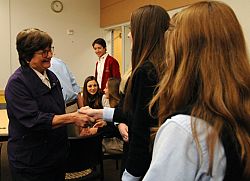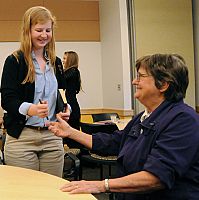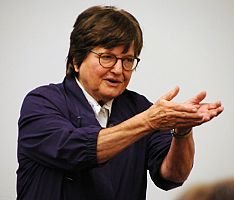'Get involved,' Sister Prejean tells students
Friday, Apr. 03, 2015

Intermountain Catholic
Photo 1 of 3
Sr. Prejean greets students from Judge Memorial and Juan Diego Catholic high schools.
SALT LAKE CITY —Sister Helen Prejean asked the students a direct question: If in some way you’re not engaged in resisting state-sponsored execution, can you be said to be complicit in the person’s death?
An activist against the death penalty, Sr. Prejean is best known as the author of Dead Man Walking, an account of her friendship with a death row inmate who was executed in Louisiana that was made into an Academy Award-winning movie. On March 24, small groups of students from Juan Diego and Judge Memorial Catholic high schools and Westminster College gathered for a luncheon presentation by the sister, who is a member of the Congregation of Saint Joseph.
Drawing the students in with questions and telling stories about her own experiences, Sr. Prejean detailed disturbing facts about the death penalty issue, such as the fact that when Jesse Tafero, a convicted murderer who was executed in Florida in 1990, the electric chair malfunctioned and flames shot out of his head.
“I heard Jesse’s mother the next night in the church saying, ‘I thought burning at the stake ended with Joan of Arc,’” Sr. Prejean said.
She then described the death of Clayton Lockett, who had been convicted of murder, rape and kidnapping, and was executed last year in Oklahoma using a lethal injection of an untested drug mixture. He was “writhing and gasping for 45 minutes,” Sr. Prejean said, beginning a discussion on what constitutes torture, and moving from there into the concept of culpability.
In the states where the death penalty is still enacted, governors defend the law as the will of the people. Therefore, individual citizens must consider whether they bear some responsibility for the deaths of those executed, “because we are a democracy, and what happens in our name we’re responsible for,” she said, noting that the “homicide” is listed as cause of death on the death certificate for a person who has been executed.
While she objects to the death penalty on moral grounds, she also pointed to the fact that the overwhelming percentage of those on death row are poor, are people of color and are convicted of killing a white person. Another criticism is that hundreds of those convicted have later been found not guilty, she pointed out.
Sr. Prejean urged the students to become involved in social justice issues.
“We live in society at a time when things are happening, and some of the things that are happening are wrong,” she said. “Your job is first to learn, and then, secondly, to see what your gifts are and where you’re going to put your gifts to be an active citizen and not a passive person like flotsam and jetsam, just pulled along on a current. … When you get involved in something really big where you’re working for social justice, you come alive in a way … you never would have. It’s not that it’s not going to be hard, and at times overwhelming … [but] we are made to do something big in our lives.”
Her call to action resonated with JMCHS senior Connor Morgan, who said he had read Dead Man Walking and was interested to hear from the author.
“I think it would be a really cool opportunity, when I go to college, maybe join some anti-death penalty group or something,” he said. “I think there are a lot of things you can do, and I think that I’m going to do as much as I can.”
JDCHS junior Spencer Jones said she was shocked by the racial aspects of the death penalty and, as a member of the school’s Human Rights International club, “it would be easier for us to take a step toward advocating for that than it would be for the death penalty, but that could in turn affect the death penalty.”
The Most Rev. John C. Wester, Bishop of Salt Lake City, said he appreciated that Sr. Prejean took the time to speak with the students. “I think that it’s important that the kids think about these things now because as Sister said, most of us are shielded from these kinds of horrors … but when you hear a first-hand account, you realize that an execution isn’t a natural death, it’s murder.”
For questions, comments or to report inaccuracies on the website, please CLICK HERE.
© Copyright 2024 The Diocese of Salt Lake City. All rights reserved.
© Copyright 2024 The Diocese of Salt Lake City. All rights reserved.



Stay Connected With Us